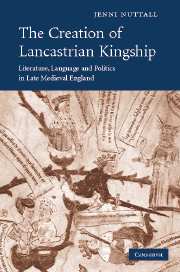Book contents
- Frontmatter
- Contents
- Acknowledgements
- Note on quotations and references
- Note on editions
- Abbreviations
- Introduction
- PART I HOUSEHOLD NARRATIVES
- 1 Stereotyping Richard and the Ricardian familia
- 2 The dissemination of the Ricardian stereotype
- 3 Politicizing pre-existing languages
- 4 From stereotypes to standards
- 5 Household narratives in Lancastrian poetry
- PART II CREDIT AND LOVE
- Conclusion: Lancastrian conversations
- Notes
- Bibliography
- Index
- CAMBRIDGE STUDIES IN MEDIEVAL LITERATURE
3 - Politicizing pre-existing languages
Published online by Cambridge University Press: 27 October 2009
- Frontmatter
- Contents
- Acknowledgements
- Note on quotations and references
- Note on editions
- Abbreviations
- Introduction
- PART I HOUSEHOLD NARRATIVES
- 1 Stereotyping Richard and the Ricardian familia
- 2 The dissemination of the Ricardian stereotype
- 3 Politicizing pre-existing languages
- 4 From stereotypes to standards
- 5 Household narratives in Lancastrian poetry
- PART II CREDIT AND LOVE
- Conclusion: Lancastrian conversations
- Notes
- Bibliography
- Index
- CAMBRIDGE STUDIES IN MEDIEVAL LITERATURE
Summary
Following Saussure, we distinguish between individual speech acts or paroles (which can, of course, take the form of written text) and the abstract linguistic system or langue of which they are a part. A langue is in fact comprised of many different langues, the particular vocabularies, idioms or rhetorics jointly shared and understood by individual users of a language. For a parole to be comprehended, it must be produced within the available possibilities of the existing langue, yet these paroles can also influence and modify aspects of the same langue from which they are constructed. ‘There is’, says Pocock, ‘a history formed by the interactions of parole and langue.’ Furthermore, these interactions occur within individual texts themselves: ‘Texts are composed of langues and paroles, of stable language structures and speech acts and innovations that modify them.’
The deposition schedule and post hoc chronicle accounts of Richard's reign exploited existing linguistic and conceptual paradigms of tyranny and immaturity to consolidate and justify Lancastrian actions. They used the pre-existing resources of the langue to create politically motivated paroles. Yet this interaction between langue and parole is a two-way process. Through the creation of these particular paroles, certain aspects of the langue itself became politicized. Pre-existing elements of the langue, namely particular topoi or metaphors, were found to be especially pertinent to the political project at hand. They became useful because they were already available and readily understood.
- Type
- Chapter
- Information
- The Creation of Lancastrian KingshipLiterature, Language and Politics in Late Medieval England, pp. 27 - 40Publisher: Cambridge University PressPrint publication year: 2007



